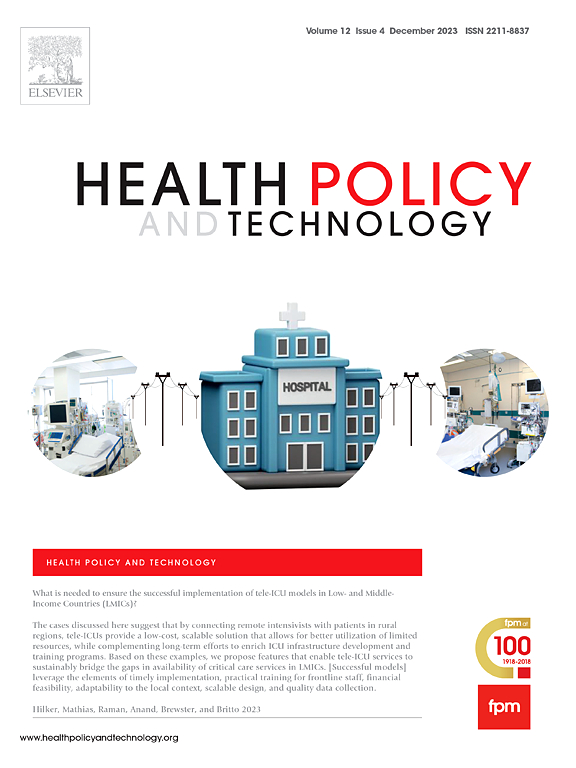Is the paper-based card a reliable storage medium for self-sampling HPV tests? A scoping review
IF 3.7
3区 医学
Q1 HEALTH POLICY & SERVICES
引用次数: 0
Abstract
Objectives
Self-sampling devices and commercial Human Papillomavirus (HPV) tests are evolving. Despite the encouraging results of a “paper smear” in 2002, along with the advantages of its transportation, brushes are more commonly used than paper-based cards for self-sampling in HPV testing. Thus, the study aimed to investigate this technology and analyze its reliability.
Methods
A review was conducted following the Preferred Reporting Items for Systematic reviews and Meta-Analyses (PRISMA) Extension for Scoping Reviews, from August to October 2024, and updated in July 2025. Six databases - Pubmed, Embase, CINAHL, Cochrane, Scopus and China National Knowledge Infrastructure (CNKI) - were used to retrieve records, with search strings translated accordingly across them.
Results
Of 122 studies, 10 met the inclusion criteria and were considered for analysis. The study populations were predominantly at higher risk of HPV infection. The findings reveal an overall agreement range of 82.4 % to 93.3 % between self-collected samples on FTA elute (Flinders Technology Associates) card/cartridge and physician-collected samples, which is slightly inferior to that found for Evalyn Brush, the most popular self-collection device worldwide. There is a lack of standardized procedures in the diagnostic chain using paper-based cards, but the use of POI (Preventive Oncology International) card and Whatman 903 filter paper expand the potential scenario of alternative low cost devices.
Conclusions
Paper-based cards, particularly the FTA elute card/cartridge, show promising results for HPV self-sampling, with high concordance, sensitivity, and specificity. However, current evidence is limited by small sample sizes, heterogeneity across studies, and lack of standardized protocols, underscoring the need for further research to validate their reliability and expand their application in HPV testing and beyond.
纸质卡片是自采样HPV检测的可靠存储介质吗?范围审查
目的自采样设备和商业化的人乳头瘤病毒(HPV)检测正在发展。尽管“纸涂片”在2002年取得了令人鼓舞的结果,而且运输方便,但在HPV检测中,刷子比纸质卡片更常用于自采样。因此,本研究旨在对该技术进行研究并分析其可靠性。方法根据系统评价和荟萃分析首选报告项目(PRISMA)扩展范围评价,于2024年8月至10月进行综述,并于2025年7月更新。六个数据库——Pubmed, Embase, CINAHL, Cochrane, Scopus和中国知网——被用来检索记录,搜索字符串在它们之间进行相应的翻译。结果122项研究中,10项符合纳入标准,纳入分析。研究人群主要是HPV感染的高危人群。研究结果显示,FTA洗脱(Flinders Technology Associates)卡/墨盒上的自我采集样本与医生采集样本的总体一致性范围为82.4%至93.3%,略低于全球最流行的自我采集设备Evalyn Brush。在使用纸质卡片的诊断链中缺乏标准化的程序,但使用POI(预防性肿瘤国际)卡片和Whatman 903滤纸扩大了替代低成本设备的潜在场景。结论基于纸张的HPV自采样卡,特别是FTA洗脱卡/盒,具有较高的一致性、敏感性和特异性。然而,目前的证据受到样本量小、研究异质性和缺乏标准化方案的限制,强调需要进一步研究以验证其可靠性并扩大其在HPV检测及其他领域的应用。
本文章由计算机程序翻译,如有差异,请以英文原文为准。
求助全文
约1分钟内获得全文
求助全文
来源期刊

Health Policy and Technology
Medicine-Health Policy
CiteScore
9.20
自引率
3.30%
发文量
78
审稿时长
88 days
期刊介绍:
Health Policy and Technology (HPT), is the official journal of the Fellowship of Postgraduate Medicine (FPM), a cross-disciplinary journal, which focuses on past, present and future health policy and the role of technology in clinical and non-clinical national and international health environments.
HPT provides a further excellent way for the FPM to continue to make important national and international contributions to development of policy and practice within medicine and related disciplines. The aim of HPT is to publish relevant, timely and accessible articles and commentaries to support policy-makers, health professionals, health technology providers, patient groups and academia interested in health policy and technology.
Topics covered by HPT will include:
- Health technology, including drug discovery, diagnostics, medicines, devices, therapeutic delivery and eHealth systems
- Cross-national comparisons on health policy using evidence-based approaches
- National studies on health policy to determine the outcomes of technology-driven initiatives
- Cross-border eHealth including health tourism
- The digital divide in mobility, access and affordability of healthcare
- Health technology assessment (HTA) methods and tools for evaluating the effectiveness of clinical and non-clinical health technologies
- Health and eHealth indicators and benchmarks (measure/metrics) for understanding the adoption and diffusion of health technologies
- Health and eHealth models and frameworks to support policy-makers and other stakeholders in decision-making
- Stakeholder engagement with health technologies (clinical and patient/citizen buy-in)
- Regulation and health economics
 求助内容:
求助内容: 应助结果提醒方式:
应助结果提醒方式:


